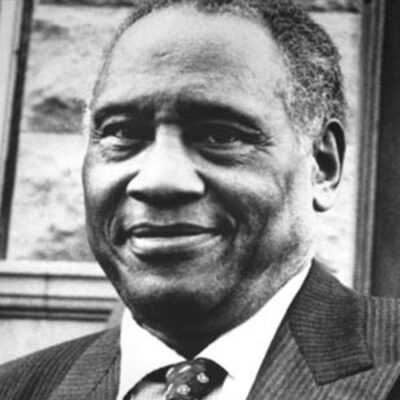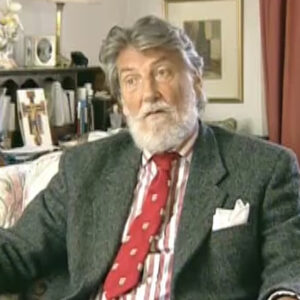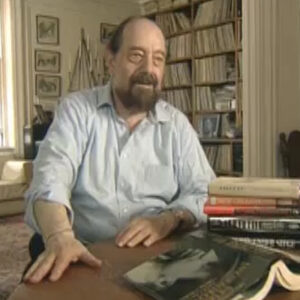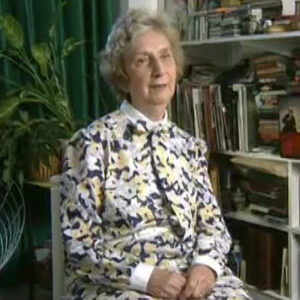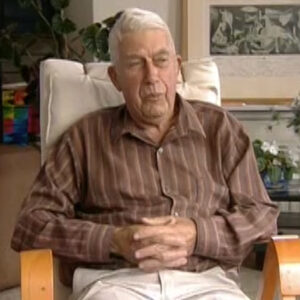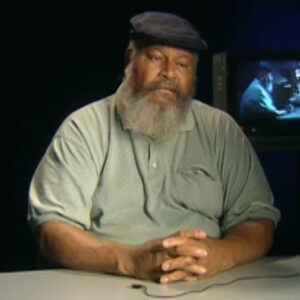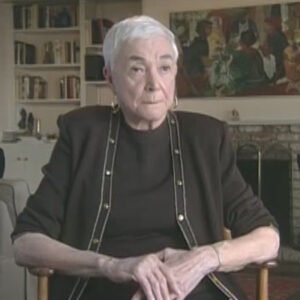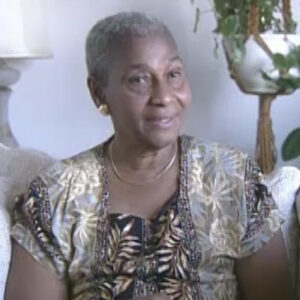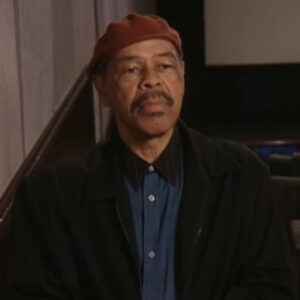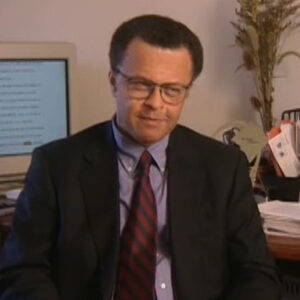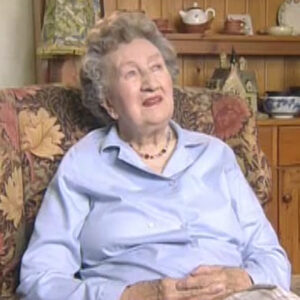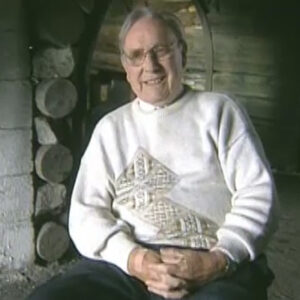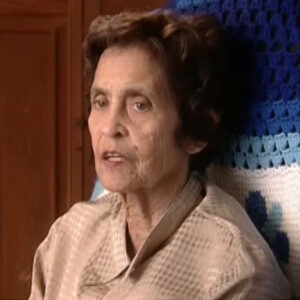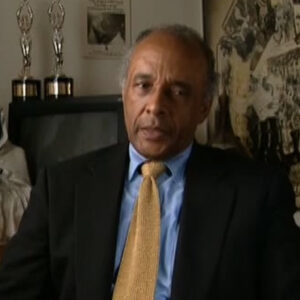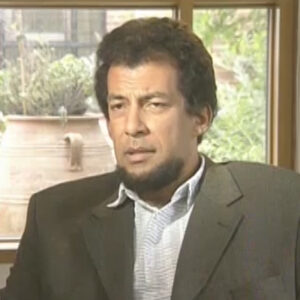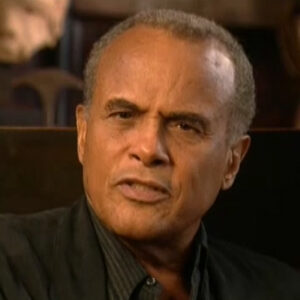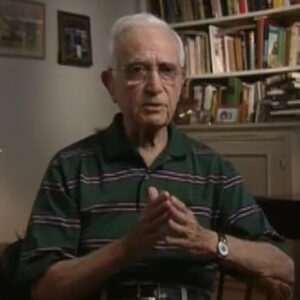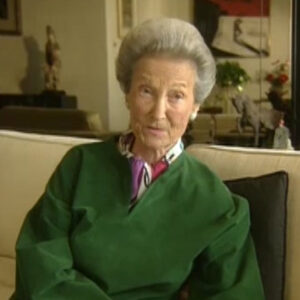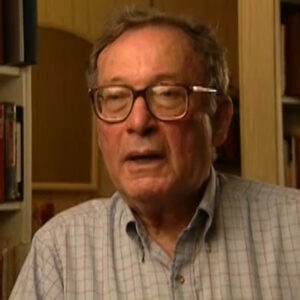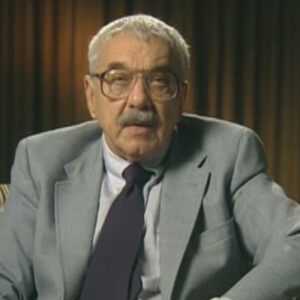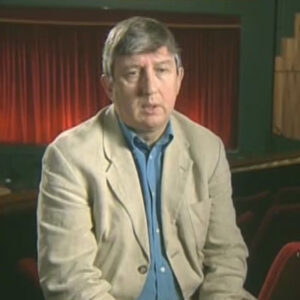Speaker Was Paul Robeson a presence in your life before you met him?
Speaker Was he ever a presence? Did you know about him before? Yes. Could you tell me about that?
Speaker Well, I grew up in a very interesting family. My father was the first black graduate, I think, of what, Ohio State University. And he was very proud of, uh, people who were doing things to advance the black community in this in this country. And Paul had just started to sing and and lecture. And he thought he was a great attribute to the. Black people in this country, he thought he was going to be so I seem to have always known about Paul Robeson from my home in Minnesota. Hmm. When someone was telling me about the first time you met him. Oh, my goodness. Do I have that much memory? It was just like I was living with Aaron Douglas. Do you know who we are? Aaron and Alex Douglas. And he came one evening to a party and just fit in so well with that group with at the Douglass’s. They lived in this building and apartment seven H.
Speaker And it was a party like who are the people, what was the scene like, the people, who are the people? I mean, you have to give you the need to work with a writers.
Speaker Oh, a few of the more writers worked. We worked together at the crisis with Dr. Dubois, and they were in various professions in music.
Speaker Dance, whatever, teaching. And it was just a nice group of people.
Speaker So what did you what did you think when you met him?
Speaker Oh, here’s a handsome man, that’s all. And he he seemed to dominate that party. He was the life of the party. Uh, I don’t think he was married yet. He hadn’t married Islanded.
Speaker But.
Speaker He was the party, um, tell me about the kind of work that you did when you when you arrived in New York and kind of what brought you to New York?
Speaker Uh. I.
Speaker Was supposed to be a teacher now, but I had been in New York visiting. There’s some friends of my parents and automobile trip across the country, and I liked Harlem because there are a lot of people here. I grew up with a completely white people. And although I have no prejudice against them, I don’t want anyone to misunderstand me, I didn’t feel at home ever in a completely white, uh. Society. And when I got offers of jobs from the south and an offer from Dr. Dubois, I flew to Harlem. I didn’t fly because we weren’t flying, but I came to Harlem as fast as I could come. What was the offer? Jesse Fosset had been working with Dr. Dubois and she had just left him. He didn’t know anything about my abilities, so he didn’t give me her job. But he gave me a job as a secretary in his office. The secretary worked with Dr. Dubois and I finally learned how to make up a magazine and all the things were necessary. So I stepped into her shoes, somehow slid into them mouth. And it was the best decision I ever made not to go south to teach, but I come to work with Dr. Revoice.
Speaker When and how you got into journalism, I think.
Speaker I didn’t know I was in journalism. I think that that was the beginning. What did you do after that? After that, he knew he was having difficulty with the leadership and the NAACP and he knew he was going to leave and he didn’t say that to any of us, but he took me under his wing and saw to it that I got a job before he left. I got a job with Amsterdam News. In there as a secretary to, you know, the name Thelma Boozer as the secretary to Thelma Bowser, but. I began to write little little paragraphs, and I soon moved up into the writing department.
Speaker What when you were with the black, did you work with the Amsterdam News mostly?
Speaker No. Adam Powell had Junior had begun to be critical of the Amsterdam News as the only black paper in this area. And he started a paper, his own called The People’s Voice. And he offered me a job there. And I was very glad to get out of the atmosphere. Uh, kill sweetheart. This is one headline. Slept with her, slept with her that night. I got tired of that kind of headline, so I was very happy to go to the people’s voice.
Speaker And I stay there as long as it.
Speaker We ought to take that off. Yeah.
Speaker Where we’re OK. Oh, yeah, we’ll just what I wanted to know was, um.
Speaker When when Paul was making a name, name, a name early in life as a concert singer, what how did the black press treat him?
Speaker I mean, did they realize that he was a star or did they just what was I?
Speaker I don’t think the black community, including the press, realized what a star he really was. And they treated him just like they would treat any other singer around. Nothing special. That’s my opinion.
Speaker But what about you?
Speaker Well, I was very happy to know I’m very thrilled to know him.
Speaker What did you think? That he was more than just a singer? Oh, of course. Well, what did you think it was?
Speaker I thought he was a leader of the black people in this in this country, if not in the world. I hadn’t been around the world any at that point, but a leader, a potential leader of our people in this country.
Speaker Do you think that he fulfilled that? I think he did very well, did as well as they would allow him to do. As a matter of fact, there was a peace meeting, a worldwide peace meeting in East Germany. You know how long it must have been that there was an East Germany and Paul was the only American slated to go to that meeting. He couldn’t get out of the country. So it looked like we weren’t going to have if this is the only country in the world that wasn’t going to have a delegate at that meeting. So he said, I never could understand why he said it. He said, let Marvel go. So I went to the meeting and it was amazing how people in the world felt about them around the world. I was elevated to a position where I should never have been elevated because I was representing not only America but Paul Robeson.
Speaker When when did you become active in radical politics and when did you join the party?
Speaker I didn’t know I was active in that. I just was doing what came naturally and not I didn’t know it was unusual or anything like that. I only knew it. I’m beginning to know it now. That there weren’t too many of us interested in this kind of life for our people around the world.
Speaker Mm hmm. And so what kind of activity did that what kind of things did you do that you thought were normal? Give me an example. Well.
Speaker Being asked to join various committees around. And I thought that was normal, but it turns out in hindsight, looking back at it, it was a little unusual.
Speaker Did you think that what Paul was doing was normal?
Speaker Yeah, didn’t seem to me to be anything unusual. He had the talents and he loved the people. And he went ahead and did what he thought was going to be helpful.
Speaker So when he got a lot of the attention, what did you think? Well, let me ask you this way. What kind of when he began to speak out more than just singing, when he began to make speeches, political speeches? What was the reaction of the black press and what was the reaction of the traditional black leaders?
Speaker Well, I think that there was no looking back at it.
Speaker And I think there was a lot of jealousy that Paul was overstepping himself.
Speaker I think that that’s what they thought about black leaders around at that time because he wasn’t, uh, well spoken of as a popular representative of our people. He was just a guy that uses mouth a lot.
Speaker And what are the black press saying this?
Speaker I wish I had you were going to ask me that?
Speaker Uh, I mean, not specifically, but generally when you were in the press or what was the general feeling of him?
Speaker The general feeling was that.
Speaker Here was a person.
Speaker Speaking his own ideas and not the ideas of his people, but I think that he was speaking for our people.
Speaker That’s what I think. And what do you think the people thought?
Speaker Well, the people I knew felt the way I did.
Speaker And like Aaron Douglas and people like their felt the way I felt. The people who read your newspapers, what do you think they thought?
Speaker Oh, I don’t know what what they thought.
Speaker I know what was printed sometimes didn’t please me because Paul wasn’t spoken of always as a leader is he just opened his mouth and said what he wanted to say.
Speaker Why? Why do you think the black press didn’t speak of him as a leader? Why do you think that?
Speaker Because I think we as a people weren’t ready, weren’t really ready yet to participate in society as a whole, we weren’t ready.
Speaker What do you mean? That’s what I think. No, I mean, what weren’t ready in my way.
Speaker Uh, educationally. Uh, professionally. We weren’t quite ready yet to meet our people, the people I knew, like Langston and Hughes and his crowd, felt that Paul was their leader and they accepted me, accepted him that way.
Speaker I didn’t find any animosity around my friends toward Paul.
Speaker OK, so your friends, who are the writers and reporters and the artists they like?
Speaker Yeah, OK. They thought he was a leader and a great one. And he was it was always a great feeling of joy whenever Paul would come around our little group now.
Speaker But some people didn’t like him. I guess there were some I didn’t know those people were.
Speaker Yeah, but you are politically active. So you knew that people like said bad things. I guess that’s what I want to know politically.
Speaker Who were the people that didn’t like the people who wanted to be a leader of of the black people but didn’t want to lead them in any new direction and.
Speaker Didn’t realize really what we had and what we as black people had in such a leader. That’s what I think. Mm hmm.
Speaker Did you ever write anything about Paul?
Speaker I don’t remember, and that’s that’s difficult. I wrote for a living and I wrote anything that came my way. So possibly I did, but I can’t remember anything particularly.
Speaker Do you remember Adam Clayton Powell? Was he positive about or was he critical?
Speaker Well, you mean Adam Junior? Junior. I don’t remember anything that he said against Paul. He was busy building his paper. And if the headline was positive to Paul and it meant selling more papers, he was for selling his paper. So, uh.
Speaker Anyway, Paul was a subject of interest to most people, most black people, I think.
Speaker And so we wrote about Paul and wrote what Paul said, but he said fitted my own ideas, so I was happy with it and Adam was happy to sell papers, so.
Speaker That now, when did you officially join the Communist Party? It’s important for black people to know that, OK.
Speaker I was while I was at the Amsterdam News, so it must have been in the early 30s.
Speaker I think it was in their early 30s, if you could say, when I joined the Communist Party, if you could say when I joined the Communist Party in and then tell me when that is when I need to hear the whole sentence. Oh, I joined the Communist Party in the 30s.
Speaker Well, I believe it was in the early 30s that I joined the Communist Party.
Speaker Why did you do that? I did it because the other parties seemed not to address the problems that were facing us as black people in this country and the Communist Party seemed at that time. And I guess the leaders even now, I don’t get out. But they seem to address the problems that were facing us as black people in this country.
Speaker Do you know if Paul Robeson joined the Communist Party, too?
Speaker I don’t know whether he did or not. If he did, it would have been held in secret because it would have been felt that he would if he was known as a communist, he wouldn’t be able to influence the black people and the problems of the black people in this country as well as he did. So I know that my party membership was not blasted around. People didn’t know what.
Speaker And I didn’t say.
Speaker Why do you think why do you think black people are afraid of communism? I mean, why do you think that is? Why do you think that you weren’t able to say that you are a communist?
Speaker The communists were looked at as a bunch of reds who were saying things to excite people but didn’t have as much what they were saying didn’t have as much real content as that as was necessary. So. I know that I personally did not go around blasting I’m in the Communist Party because I would not have been able to go into many of these, uh, situations. I was able to go in without without a lot of animosity shown.
Speaker Know, I mean, I see what you mean. Oh, I see what you mean.
Speaker I hope I hope I’m not being too vague when I say it makes sense.
Speaker Makes sense.
Speaker So, for instance, when I went home and told my father was still living and I said I joined the Communist Party, he said, that doesn’t surprise me. I was I am a Eugene Debs socialist in the Communist Party, grew from that organization. So.
Speaker Did you you remember when Paul Robeson was boycotted?
Speaker He couldn’t get concerts and his passport was taken away? What was the reaction? Oh, what did the black newspapers do today? Do they agree with that or do they say that was wrong?
Speaker I mean, generally, I don’t think that they came out and said it was wrong and there was no, um, paper at that time except possibly the people’s voice that would take up the Robertson cause. I don’t think so. Why? Because they the paper the papers that I knew about did not want to be labeled communist front. I think that is why it’s too radical.
Speaker But these were black people and poor was black and he had always spoken out for them. I know. I know.
Speaker But because he did didn’t make them necessarily believe in what that’s the role they should take, I don’t think that’s true. The people I knew, like your father and mother, were certainly proud of Paul, and even though now I’m not talking about your parents, but even though these people wouldn’t speak out for him in public because that was an unpopular cause, they believed in him. He was a.
Speaker He was a.
Speaker Reckoned he was somebody they were proud of.
Speaker I don’t know how.
Speaker They could not have been proud of him. He he broke all barriers to their being in life as a whole person.
Speaker Do you think when when Khrushchev announced that they had been over Stalinism and it had been trials and, you know, and there was all these announcements about the way things have been in Russia and the Soviet Union and a lot of excuse me, I’m sorry, um, if, uh, you know, everybody a lot of people came to power, said don’t continue to support the Soviet Union.
Speaker You know, because it’s just say maybe you didn’t know to save his career, but he didn’t.
Speaker Did you ever did you were there any discussions among the party about what he should do and whether he should? And what was the discussion?
Speaker I couldn’t answer that question because because a few people knew I was in the Communist Party, but I was not known generally. So I didn’t get involved in those discussions. But I know that I was not stopped from supporting Paul and everything he was doing. So I suspect the party Communist Party was proud of the road is taking.
Speaker Did you go to the Freedom Ways events for Paul?
Speaker Did I know where did you go? Did you attend? I passed.
Speaker I attended anything for Paul, so I imagine I was there.
Speaker What was your what do you think there again when he was under attack, being boycotted?
Speaker Do you think the the traditional black leaders, some people say that they collaborated with the government. Do you believe that or what do you think?
Speaker I believe many of them would have would have collaborated with a government. That was what you said. I think many of them would have they wanted personally to get along. And if the government was taking a certain role, they’re going to recall their role. But there were some rebellious people like poor like me that didn’t did not necessarily go along with the government and the government policy.
Speaker When the how often did you see Paul over his first time he met him? I don’t.
Speaker Were you close friends or we were quite close friends. I think I saw him as often as possible. He was very busy traveling and I was very busy and doing what I did best. That was writing.
Speaker Do you remember the last time you saw.
Speaker The possibly the last time I saw him was a very in a close situation, we had gone to Westchester. Did I say this before? We had gone to Westchester? I had a friend with my husband and I had a friend that only black people in a community and often near Ossining. And we thought there that it would be wonderful if Paul could sing up there because it was a wealthy area and we could make a lot of money for Paul’s causes.
Speaker So we made an appointment and visited my friend in Westchester. And we’re talking there are four or five of us. My husband was in the group talking about the possibility of a concert in that area, completely void area except for this one family. And they lived in a mansion and it was early evening. And all of a sudden our hostess said to somebody, not in our little group, children go on the bed. This has nothing to do with you. And the children said, we would like to hear Mr. Robeson sing. And Paul turned around in his chair and sang lullabies from many lands to those children for almost an hour at actually the most beautiful evenings I can ever remember.
Speaker The children sat on my stairs transfixed and saw Paul saying to them exclusively, my, uh, lullabies from many lands. It was a beautiful evening.
Speaker Wow, that’s nice. You should have been there with our cameras, the car. We should have been there with our cameras. Yeah, you should have for that.
Speaker I am blaming you. I’m criticizing you. OK?
Speaker Yeah. Um, when did did you, uh.
Speaker I guess I guess. Did you go down and visit him in Philadelphia when you stayed at his sister’s house? Did you ever go down there? No, I never went. Did you ever write him or.
Speaker I wrote him quite regularly that you write back, huh? Did he write back? Oh, I got I had several notes from him. I wish I had known that they’ve looked for them, but I had several notes from Paul.
Speaker Could you could you get an idea of how he felt from those notes, how he felt? Yeah. What I was thinking about those days. Could you talk about that?
Speaker He was he always felt that he he was destined to break into with his talents, break into the homes of the world and bring whatever his message was to them. He never was just passive. Never, never.
Speaker It was really a great pleasure to have known Paul. Let’s cut for a second start, as we said, I don’t know, I guess there are a lot of things I wish I was after you leave here, you’ll say, oh yeah, well, but even now what?
Speaker Um, yeah.
Speaker What then? You worked for the boys in Newport, Rhode Island. Did you ever see them together? No, never did. Do you know what their relationship was like?
Speaker It had a very good relationship. Why? Because they stood for the same things. They wanted the same things for our people and old people.
Speaker Uh, Dr. Dubois was silent. OK, so that’s the boy was arrested for the same things you said.
Speaker Yeah. But he was so different from the picture that most black people had audiences for us ahead of him. He was not, uh, stiff and unapproachable or anything like that. As a matter of fact, in that whole office that I saw, James Earl and Johnson, Thurgood Marshall and Walter White, Dr. DeBois started as one of the whole group that will come in as soon as we got to the offices, take out his office outer coat and be one of the gang. He was really one of us and we had a very good relationship with him.
Speaker Yeah, but everybody thinks it was different for him, but he wasn’t. What was Paul? Uh, I was Paul when he was, you know, off the stage.
Speaker He was a very relaxed human person, very easy to know, talk about, laugh about anything, the things that we laugh about and hold dear.
Speaker Yeah. So, uh, is there anything in your life as a political activist that you would do differently?
Speaker That I would do differently, yeah. I would just have done more of what I was doing than I did.
Speaker I didn’t realize that I was, uh, uh, uh, going.
Speaker Going the way that my father and mother had taught me to go, didn’t it was just natural for me to do the things that I was doing to be involved in the organizations I was involved in.
Speaker What did you think of that? Well, honestly, I didn’t think she was worthy of Paul.
Speaker She was, uh, very, uh, wanted to be the head of women’s organization. She wanted to be. I remember once there was a meeting, Paul and Cathy were on the podium, set very far apart and didn’t speak about the same things. But when Paul got up, he was talking about DeRisi. When he got up, she was talking about DeRisi.
Speaker And two people couldn’t have been more different than they were on that podium that night.
Speaker Paul was speaking to everybody who wanted us to go forward and do the things that we were supposed to do as they wanted us to get ahead.
Speaker Well, I don’t know. It’s all right.
Speaker Well, why do you think I mean, this is all in hindsight, but what do you think? They got married. Why do you think they thought that?
Speaker Well, there was a doctor here named Dr. Magine. Uh, she was my doctor. And Paul used to go to see me at least once a week so that they could talk about things that were in their hearts. And the last time they’d seen each other, they were talking about the things that were in their house, goals they wanted to achieve for the black people.
Speaker And suddenly Paul came to see her essay. I’ve been caught, he said, I’ve been caught. And he said he was caught by, uh, a slander.
Speaker And he couldn’t go the way he wanted to go as freely with slender.
Speaker In his daily life, that’s what he meant.
Speaker Confused, huh? Maybe I’ll say it again. I didn’t maybe I didn’t say it well at all.
Speaker Yeah, what would you say to him? I just he used to go to see Dr. Chin.
Speaker Oh. At least once a week so that they could talk about their, uh, get goals for the black people and things like that. So he came in this day and Dr. Chen was so happy to see him that I always said was I have been caught. He has been caught by Desmond and he was caught in such a way he felt he had to marry her. All of us were can’t imagine what that must have meant, that they had a very close relationship. But anyway, he kept on on his road. He didn’t change anything, but he did marry a slander that did.
Speaker Did you know, uh, a woman, a young woman named Neil Gerald Gerin, you know. So what about this woman, Yolanda Jackson, the woman in London? You ever heard about her?
Speaker I’ve heard about a woman in London, but I can’t talk about it.
Speaker So this is mention one was one that was in school and he was out of school or he was going to Columbia.
Speaker I think at the time he was in New York and it must have been while he was at Columbia. Anyway, he and me were very good friends and used to talk about the same things that they wanted for our people.
Speaker Well, uh, well, well, clearly in their life, you know, you’re right, he, uh, he did go on his own track, but, uh, as he always wanted to be seen to be to want to manage him, wanted to manage him to be in control of him.
Speaker Was that your perception? I think so.
Speaker I think so. He, uh. Did you see any examples of that? Could you tell me a little things about that?
Speaker After you leave out, remember things that I should say? I know it’s pretty difficult. He was leading such a public life and for his people. That he was pretty hard to catch up with. It was very unusual, I know that there was a big event at Carnegie Hall and I was among the little people who were trying to be sure that this place was filled the room with Paul. Paul came and worked with that committee like he was one of the committee. He really put his whole heart into anything he went into. It is wonderful to work with him.
Speaker Um, well, I can’t the. I can’t think of any names and I don’t think I’ve been as.
Speaker Really, as I should somehow, I should have known more.
Speaker Well, you could, because, I mean, I could ask you some more questions, you know, but yeah, you know, I see people turning against one guy that was offended. Yeah.
Speaker I didn’t hear him talking about the NAACP about why they turned against him after he won the Spring Art Award. Yeah. And then two years later, they, like, condemned them. Why do you. What are you sorry. Why do you think that? Why do you think they condemn them?
Speaker Because he wasn’t going along the popular road that would help them.
Speaker That’s what I think when you talk that when you answer a question, you got to you got to incorporate my question in the way you talk.
Speaker Because, in other words, when you say them well, I mean, the NAACP, the crowd that supported the NAACP, I, I personally, I left there. I didn’t stay there very long, maybe two years.
Speaker When you work with the NAACP.
Speaker Well, you couldn’t help it. You were in the same office with them.
Speaker And you could if you can say I work with the and I work with them.
Speaker I work for the crisis with Dr. Dubois, who was a part of that whole NAACP crowd, seemingly. But he wasn’t up here.
Speaker He was far more free than they were then.
Speaker Walter White, for instance, was very young at that time, and just learning is when he wanted to go to the popular road.
Speaker And then he and then he did what, Paul?
Speaker Well, he didn’t do it to Paul, he did it for himself.
Speaker He went along the popular road that would enhance his his role with the black community around the world.
Speaker Well, but the black community around the world was supporting Paul, right? I think they were.
Speaker OK, why do you think the NAACP turned against Paul?
Speaker I think they’ve turned against Paul because Paul is looking at me and thinking, what did you say?
Speaker So you got to you just talk to guys closest to. Oh.
Speaker Saying the NAACP turned against Paul.
Speaker That I don’t know that they turned against Paul, they just went the way that they felt would bring them most, um. And they will get the largest audience among black and working people, and they felt that Paul was too radical with expressing things that were too radical. I feel that that’s true.
Speaker Mm hmm. Now, here’s a question I want to ask you everybody. Most people that we talked to said that black and working people like Paul and it was only the leaders who. Did you agree with that?
Speaker I think that that’s true. It looked like he was trying to get into the leadership. He was in the leadership, but they wanted to get their ideas to predominate. And their ideas were not Paul’s ideas of reaching people.
Speaker Uh, one last thing. Why do you think that Paul Rosen is important to America, is important to America?
Speaker Yeah. Why do you think it’s important to America?
Speaker I think he’s important to America and to the world because I hope that this plane is this plane.
Speaker Airplane. Oh.
Speaker Do you think Paul Robeson is important to America and the world?
Speaker I think he’s important to America and the world because, uh.
Speaker It looks like the real road to freedom for all people is, uh. That we all get behind a leadership that can win and Paul is taking that road. It’s not very clear, I’m sorry.
Speaker I think he’s a model for people who think that Paul was a model.
Speaker I think he was I think they were a lot of people that were jealous of him and afraid of him. But I think he was. I’m very proud that I was lived long enough to become his friend.
Speaker Did you are you surprised at the acclaim that he’s getting now, you know, after all the years of him being criticized and everybody’s happy and, you know, proud to say that they do?
Speaker I’m not surprised because he was walking the road to freedom of all people.
Speaker He.
Speaker He’s saying for us, he wrote for us, he spoke for us, he did everything.

